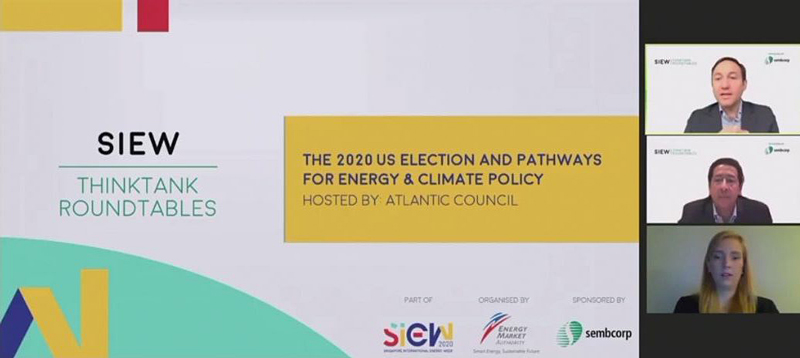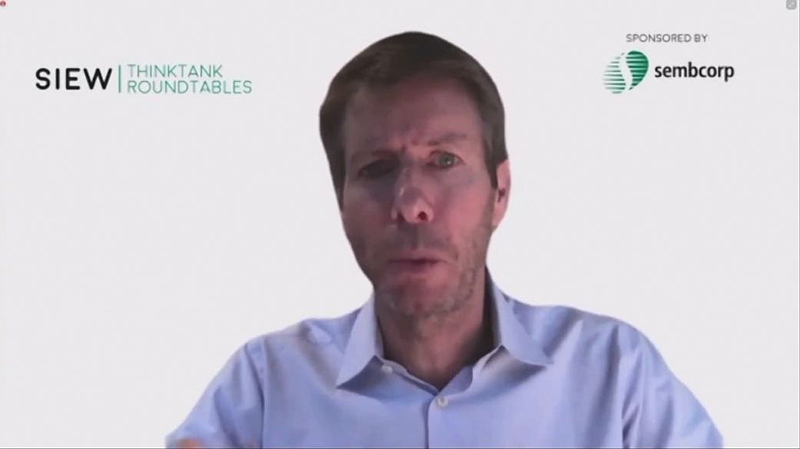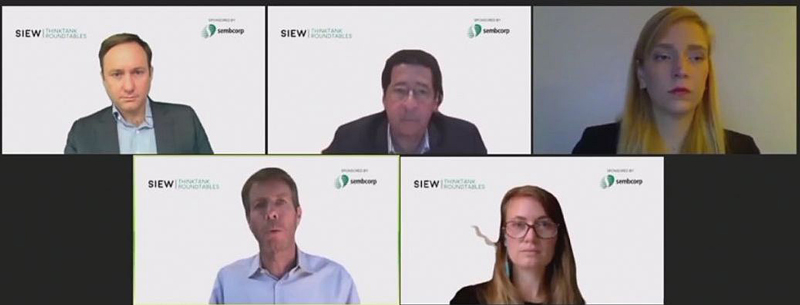During SIEW Thinktank Roundtable H hosted by the Atlantic Council, experts weighed in on how the upcoming US Presidential Elections could impact the future pathways of climate policies.

Mr Randolph Bell, Director of Global Energy Center, Atlantic Council, and Mr Richard Morningstar, Founding Chairman of the Atlantic Council Global Energy Center, set the tone for the Roundtable discussion with their opening statement: “With the US presidential election and COVID-19 shutting down major economies, the decision Americans will make next week will have consequences far beyond the US borders because the two candidates are presenting starkly different visions for the future of US energy policy.”
This was followed by several keynote addresses that examined the implications for energy market across the world.
Mr David Goldwyn, Chairman of the Atlantic Council Energy Advisory Group, began his presentation by reiterating the gravity of the upcoming election with regards to climate change: “This will be a consequential election for energy and climate, not just in the US, but perhaps for the world. What’s at stake here is whether the US will be a leader or a laggard on climate policy, and whether it will support and invest in or resist and contest the scientific consensus and the scientific community.”
Ms Andrea Clabough, Associate at Goldwyn Global Strategies, pointed out that it could be difficult for the US to return to a pre-Trump era’s foreign policy, even if Former Vice President Joe Biden wins the upcoming election. “We do know that Biden is very much
interested in resetting US foreign policy to something akin to the Obama era status quo. But in reality, that's going to be very difficult to do,” Ms Clabough said.

Mr John Morton, Senior Fellow at the Atlantic Council, and Former Senior Director for Energy and Climate Change at the National Security Council, warned that failure to keep temperature rise below two degrees celsius could cost the global economy US$750 trillion by the end of the century. However, Mr Morton does see some positive changes in how countries, institutions and corporations are accounting for carbon.

Ms Margaret Jackson, Deputy Director for Climate and Advanced Energy at Global Energy Center, spoke about what COVID-19 has taught us about how countries must respond to climate change: “We've witnessed the important role that big government must play to stop a pandemic from spreading around the world. Climate change action is not a choice. It's an imperative for countries around the world, especially developed countries who are responsible for high historic emissions, to be responsible for leading the transition away from fossil fuels and assisting developing countries with mitigation and adaptation.”

In a panel discussion moderated by Mr Bell of the Atlantic Council, the speakers discussed other issues pertaining to evolving market dynamics and energy transition:
- Mr Goldwyn said that it is going to be a tricky issue for higher LNG uptake because coal remains the dominant fuel in Asia, and an affordable alternative to coal is needed to facilitate change on a large scale.
- On the topic of methane, Ms Clabough explained that “the Biden team has been very clear that they want to move forward with regulation of existing and new sources of methane”. The real question, though, is how quickly that plan will prove to be effective.
Follow us on Twitter (@SIEW_sg) to get the latest #SIEW2020 updates throughout the day!